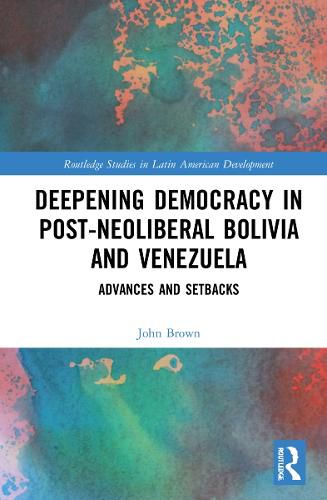Readings Newsletter
Become a Readings Member to make your shopping experience even easier.
Sign in or sign up for free!
You’re not far away from qualifying for FREE standard shipping within Australia
You’ve qualified for FREE standard shipping within Australia
The cart is loading…






This book provides a timely and nuanced analysis of the successes and shortcoming of efforts to move beyond market democracy in Bolivia and Venezuela.
A twin crisis of democratic representation and socio-economic precarity created space for anti-system outsiders to emerge on the left flank of traditional party-systems in Bolivia and Venezuela, paving the way for a post-neoliberal democratization process. Over the course of the projects headed by Evo Morales in Bolivia and Hugo Chavez and his successor Nicolas Maduro in Venezuela, however, power struggles emerged between a recalcitrant elite, the left-led government, and organized popular sectors. These tensions shaped the pathways that processes followed, with simultaneous democratization and de-democratization occurring whereby a partial deepening and extending of democratic quality for popular sectors was accompanied by the bending of liberal norms. Comparing the varying balance and forms of power between competing actors, this book offers a novel and rich explanation of the partial and stuttering efforts to advance a post-neoliberal democracy in Bolivia and Venezuela.
Bringing important insights on the reasons for the emergence of anti-system leaders and parties, the impact that they have on the quality of democracy, and how progressive governments interact with social movements, this book will be of interest to researchers studying Latin America, as well as those specializing in development and political science more broadly.
$9.00 standard shipping within Australia
FREE standard shipping within Australia for orders over $100.00
Express & International shipping calculated at checkout
This book provides a timely and nuanced analysis of the successes and shortcoming of efforts to move beyond market democracy in Bolivia and Venezuela.
A twin crisis of democratic representation and socio-economic precarity created space for anti-system outsiders to emerge on the left flank of traditional party-systems in Bolivia and Venezuela, paving the way for a post-neoliberal democratization process. Over the course of the projects headed by Evo Morales in Bolivia and Hugo Chavez and his successor Nicolas Maduro in Venezuela, however, power struggles emerged between a recalcitrant elite, the left-led government, and organized popular sectors. These tensions shaped the pathways that processes followed, with simultaneous democratization and de-democratization occurring whereby a partial deepening and extending of democratic quality for popular sectors was accompanied by the bending of liberal norms. Comparing the varying balance and forms of power between competing actors, this book offers a novel and rich explanation of the partial and stuttering efforts to advance a post-neoliberal democracy in Bolivia and Venezuela.
Bringing important insights on the reasons for the emergence of anti-system leaders and parties, the impact that they have on the quality of democracy, and how progressive governments interact with social movements, this book will be of interest to researchers studying Latin America, as well as those specializing in development and political science more broadly.